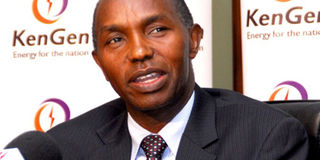Geothermal to help reduce cost of power

PHOTO | FILE KenGen managing director Albert Mugo. With the commissioning of the new project, the cost of electricity will fall dramatically, which will translate into reduced power bills and cost of living. For business it means a lower cost of production.
What you need to know:
- Currently, geothermal accounts for close to 30 per cent of the total national power output, but ultimately, it is poised to become the country’s largest source.
- Since geothermal is not subject to fluctuations in international oil prices, it offers a more affordable source of power in the long run. At US 7 cents per kilowatt hour, geothermal is far cheaper than diesel at US 22 cents. Moreover, it is highly available.
- With the commissioning of the new project, the cost of electricity will fall dramatically, which will translate into reduced power bills and cost of living. For business it means a lower cost of production.
Soon, Kenyans will begin enjoying the benefits of cheaper power thanks to the Olkaria IV 140MW geothermal project, which will be commissioned by President Kenyatta later this week.
This project, alongside two new units at the Olkaria I power plant, will add 280MW megawatts of electricity to the national grid.
In 1956, the Kenya Power Company, the precursor to the Kenya Electricity Generating Company (KenGen), successfully drilled the country’s first geothermal well in Olkaria. However, it was only in 1981 that the first power plant was built.
The country is now one of the largest geothermal power producers in the world, thanks to concerted efforts by the government and energy sector players like KenGen to tap into this source of clean, affordable and reliable energy.
Kenya is a country of many firsts. Besides boasting one of the world’s largest geothermal wells with a capacity of 30MW (the average well yield is 5-8MW), Kenya is now home to the largest single geothermal power project in the world, the Olkaria 280MW.
Kenya has also pioneered the use of innovative mobile wellheads that enable rapid deployment of geothermal power. Given that it takes several years to build a geothermal power plant once a well has been drilled, the wellhead technology allows for the steam to be harnessed awaiting construction of the plant.
Currently, geothermal accounts for close to 30 per cent of the total national power output, but ultimately, it is poised to become the country’s largest source.
Geothermal is a clean source of energy.
ERRATIC WEATHER
Unlike, say, fossil fuels, it has minimal adverse impact on the environment. Moreover, it is a renewable source as it relies on natural steam found in abundance in the volcanically active areas of the Rift Valley.
For many years, Kenya relied on hydro- or rain-fed electricity, which is susceptible to the vagaries of weather brought on by global climate change.
Erratic weather patterns have forced the country to routinely switch to the more expensive diesel or fuel-based generation. The net result is spiralling electricity bills.
Since geothermal is not subject to fluctuations in international oil prices, it offers a more affordable source of power in the long run. At US 7 cents per kilowatt hour, geothermal is far cheaper than diesel at US 22 cents. Moreover, it is highly available.
What this means is that geothermal holds the key to affordable and reliable energy. By shifting focus to geothermal energy, Kenya is firmly on the path to energy sustainability.
With the commissioning of the new project, the cost of electricity will fall dramatically, which will translate into reduced power bills and cost of living. For business it means a lower cost of production.
Indeed, availability of affordable, reliable power is a key parameter in gauging the economic competitiveness of a country. The cost of power in Kenya is higher than in countries like Ethiopia, South Africa and Egypt, which are competing for foreign investments with us.
Ethiopia relies heavily on hydro, South Africa on coal while Egypt is dependent on Liquefied Natural Gas. With geothermal, Kenya stands a good chance of attracting more foreign investors.
Mr Mugo is the KenGen managing director.





